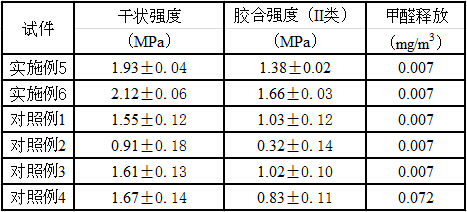A kind of soybean meal adhesive for blockboard and preparation method thereof
A technology of blockboard and adhesive, which is applied in the field of boards, can solve the problems of limiting the durability of wood-based panels in industrial applications, the release of free formaldehyde, and poor water-resistant bonding performance, so as to facilitate conduction and dispersion and improve bonding. Performance, the effect of improving initial tack
- Summary
- Abstract
- Description
- Claims
- Application Information
AI Technical Summary
Problems solved by technology
Method used
Image
Examples
Embodiment 1
[0029] A soybean meal adhesive for blockboard, comprising the following components: 22g soybean meal powder, 86g distilled water, 2g trypsin, 1g composite viscosity modifier, 2g branched polymer crosslinking agent, 0.04g calcium phosphate;
[0030] The preparation method of described branched polymer crosslinking agent comprises the steps:
[0031] S1. After reacting phthalic acid, maleic anhydride, and diethylenetriamine at 150°C, cool down and dilute to obtain a hyperbranched amino polymer;
[0032] S2. After mixing epichlorohydrin, solvent, and the hyperbranched amino polymer at 60°C for reaction, adjust the pH to 8 to obtain the branched polymer crosslinking agent;
[0033] The composite viscosity regulator includes polyvinyl alcohol, sodium carboxymethylcellulose, and bentonite at a mass ratio of 1:1:5.
Embodiment 2
[0035] A soybean meal adhesive for blockboards, comprising the following components: 26g of soybean meal powder with a protein content of 43%-45% and a particle size of 160 meshes, 86g of distilled water with a pH of 7.3-7.5, 3g of trypsin, and 2g of compound viscosity Regulator, 3g branched polymer crosslinking agent, 0.08g calcium phosphate;
[0036] The preparation method of described branched polymer crosslinking agent comprises the steps:
[0037] S1. After reacting 0.9mol phthalic acid, 0.1mol maleic anhydride, and 1.4mol diethylenetriamine at 150°C for 3 hours, cool down and dilute with water to obtain a hyperbranched amino polymer, add water to dilute to a hyperbranched amino polymer The mass fraction of is 25%;
[0038] S2. Mix 25g of epichlorohydrin, 50g of water, and 50g of the hyperbranched amino polymer with a mass fraction of 25% and react at 60°C, then adjust the pH to 8 to obtain the branched polymer crosslinking agent.
[0039] The composite viscosity regula...
Embodiment 3
[0041] A soybean meal adhesive for blockboard, comprising the following components: 25g protein content is 43%-45%, particle size is 160 mesh soybean meal powder, 86g pH is 7.3-7.5 distilled water, 2.5g trypsin, 1.5g Compound viscosity modifier, 2.5g branched polymer crosslinking agent, 0.06g calcium phosphate;
[0042] The preparation method of described branched polymer crosslinking agent comprises the steps:
[0043] S1. After reacting 1.8mol phthalic acid, 0.2mol maleic anhydride, and 2.8mol diethylenetriamine at 150°C for 3 hours, cool down and dilute with water to obtain a hyperbranched amino polymer, add water to dilute to a hyperbranched amino polymer The mass fraction of is 30%;
[0044] S2. Mix 50g of epichlorohydrin, 100g of water, and 100g of the hyperbranched amino polymer with a mass fraction of 25% and react at 60°C, then adjust the pH to 8 to obtain the branched polymer crosslinking agent.
[0045] The composite viscosity regulator includes polyvinyl alcohol,...
PUM
| Property | Measurement | Unit |
|---|---|---|
| particle size (mesh) | aaaaa | aaaaa |
| strength | aaaaa | aaaaa |
Abstract
Description
Claims
Application Information
 Login to View More
Login to View More - R&D
- Intellectual Property
- Life Sciences
- Materials
- Tech Scout
- Unparalleled Data Quality
- Higher Quality Content
- 60% Fewer Hallucinations
Browse by: Latest US Patents, China's latest patents, Technical Efficacy Thesaurus, Application Domain, Technology Topic, Popular Technical Reports.
© 2025 PatSnap. All rights reserved.Legal|Privacy policy|Modern Slavery Act Transparency Statement|Sitemap|About US| Contact US: help@patsnap.com

